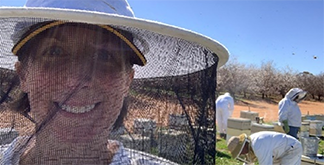Victorian Bee Biosecurity Officer update

Ally Driessen, Bee Biosecurity Officer
At the end of 2019 and beginning of 2020, Victorian Bee Biosecurity Officer Ally Driessen focused on bee biosecurity and disease and pest risk mitigation through:
- Supporting beekeepers who have notified the department about pests, diseases and bee deaths. These are mostly cases of suspected American Foulbrood (AFB) and chalkbrood.
- Supporting councils (through the Apiary Code of Practice) in regard to members of the public enquiring about beekeeping on neighbouring properties.
- Providing guidance to beekeepers as to what they can and can’t do during declared fire danger periods and guiding beekeepers affected by fires to get support.
- Enhancing Victoria’s new digital platform. This application will achieve improved measurement, analysis and reporting of Victorian honeybee health data but more importantly the platform will enable registered apiarists to log compliance, surveillance and emergency preparedness activities.
- Preparing for State Quarantine Response Team (SRQT) training which will be rolling out March 2020.
- Digitalising the Sugar Shake Program through BeeMax.
- Preparing beekeeper requirements for almond pollination 2020. Focusing on pre-pollination beekeeper auditing and planning for the almond pollination field day with the Victorian Farmers Federation (VFF) – Beekeepers Branch.
Things to focus on this month
This month Ally recommends focusing on the following:
- Check, feed and super up your hives.
- Check for AFB before removing any honey.
- If you are extracting honey in a built-up area, place the stickies back on the hives after dark for the bees to clean out or re-fill.
- Collect pooled honey sample and send off for testing (call Gribbles for your honey culture test kit 1300 307 190).
Reminders
- Apiarists affected by the East Gippsland and North East/Upper Murray fires should report any destroyed or damaged hives to us on 1800 226 226 (select option ‘0’ then ‘4’ to speak with an operator) to help us understand the damage to the apiary industry and tailor assistance to beekeepers as quickly as possible. For more information on the bushfire recovery visit Agriculture Victoria’s website.
- Residential beekeepers: follow the Apiary Code of Practice to ensure your bees don’t become a nuisance to surrounding people, property and domestic animals. Open communication between you and your neighbours is vital to a harmonious relationship.
- If you suspect a notifiable pest or disease you must notify an Agriculture Victoria Apiary Officer via the Customer Service Centre on 136 186 or email: biosecurity@agriculture.vic.gov.au
- Update your sugar shake test results by logging into BeeMax here: agriculture.vic.gov.au
Victorian industry statistics
Ally said that as of January 2020 there were 9356 registered beekeepers and 124187 bee hives in Victoria. An overwhelming majority of new beekeepers are in the 1-5 hive category.
Table 1. Victorian industry statistics as of January 2020
| Category |
Number of beekeepers |
Number of hives |
| 1-5 |
8277 |
18096 |
| 6-50 |
854 |
17947 |
| 51-500 |
173 |
35456 |
| 501-1000 |
30 |
25100 |
| 1000+ |
22 |
27588 |
| Total |
9356 |
124187 |

